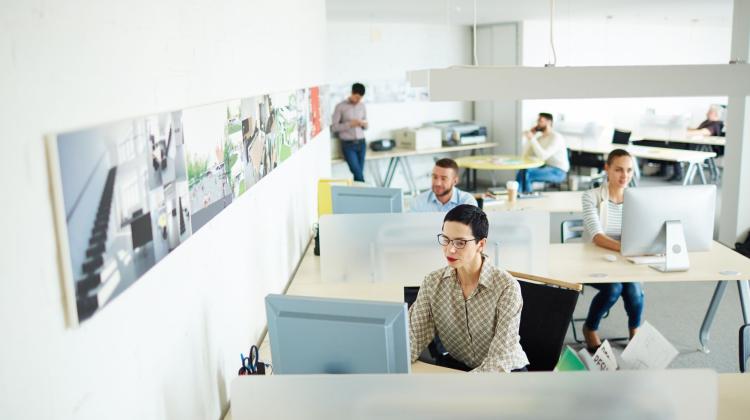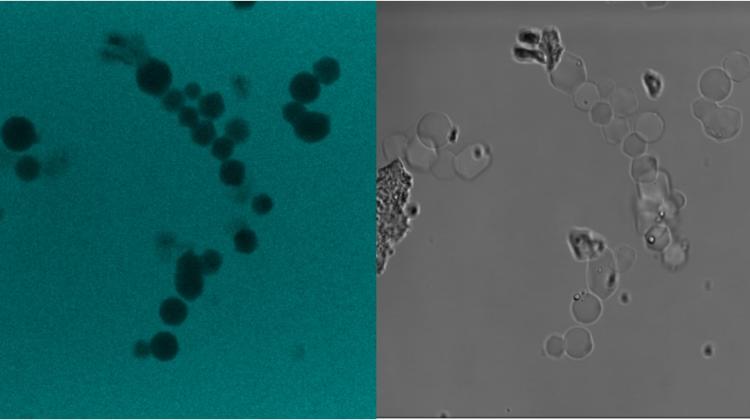Noise in open space does not necessarily make it difficult to work

The noise coming from, for example, devices in open space, does not always have to make it difficult to work. Sometimes it "blurts out" the sounds of co-workers\' conversations, preventing us from focusing on their content and increasing our level of concentration - according to a study conducted by students of the AGH University of Science and Technology in Kraków.
According to the current state of knowledge and observations of open space office workers, higher - than in traditional buildings - noise levels in rooms of this type make it difficult to focus and negatively affect the quality of work. Acoustics students from AGH University of Science and Technology in Kraków decided to make their contribution to the study of open space offices. They conducted their own experiment in one of the offices in Kraków.
"It may seem that if we add the noise from devices such as air conditioning added to the noise of employees\' conversations, the comfort of our work will be reduced. But our experiment has shown that such noise does not have to exclusively negative consequences. In fact, the noise masks people\'s conversations so that the other employees can work more efficiently and get better results. Paradoxically, the sounds of devices such as air conditioners in offices can help work better because they prevent us from focusing on the conversations of co-workers" - told PAP one of the authors of the study, Aleksandra Dębska.
In the first stage of the study, the students decided to find out what the workers themselves say about the noise in the office. They surveyed 35 employees, asking whether they were bothered by conversations and noise in the office, street noise, air conditioning, and how they assess the effectiveness of the so-called partition walls.
"It turned out that while noise from the street or air conditioning does not bother the employees, conversations of co-workers cause discomfort" - explained AGH student Agnieszka Wójtowicz. "In addition, many people said partition walls do not work, they do not adequately isolate the noise" - she added.
In the next part of the study, the students performed acoustic measurements in the examined rooms; they determined how intelligible were the words spoken by the co-workers talking in the office, calculating the STI (Speech Transmission Index). The study area was 25 meters long. "It was not until half the distance that the words spoken by the workers became not intelligible and did not disturb" - said another author of the study, Natalia Skowronek.
Measurements were also needed in the last part of the study. AGH students built an open space office analogue, two workstations separated by a partition. from one workstation they played the voice mimicking conversations and reaching the level of over 50 decibels, which was the level measured in Kraków office. They also set the recorded and emitted sounds, such as air conditioning or office equipment, at the same level as measured at the study site.
On the other side of the partition they placed a microphone and checked how the noises sounded. Later, they added two types of absorbers: 5 cm thick foam and 2.5 cm thick fibrous layer. After these two "treatments" they checked the sound propagation again.
"Finally we invited a group of testers who were asked to do the task of matching elements under the pressure of time. Each of the subjects had to perform six tasks, each in different acoustical conditions. After these simulations it turned out that when we added a recorded noise, for example from office equipment, to the voice of the lecturer, the responses were better. The productivity of the employees increased by 15 percent, because they did not understand what the lecturer said. They could isolate themselves and focus more on their work" - said Dębska
The study also confirmed that increasing the height of the partition walls allows to reduce the noise level in the workplace. However, such treatment may increase the intelligibility of the conversations of people working around us. These conversations do not always relate to our tasks, sometimes refer to the tasks of others, and sometimes they are just office talk.
Agnieszka Wójtowicz also noted out that partition walls should be made from materials that absorb sound better. "If teamwork is often used in the office, such an effective sound absorption is not necessary, but if we want to separate employees who largely perform individual tasks, it is better to use higher partitions" - said Wójtowicz.
PAP - Science and Scholarship in Poland, Ewelina Krajczyńska
ekr/ agt/ kap/
tr. RL
Przed dodaniem komentarza prosimy o zapoznanie z Regulaminem forum serwisu Nauka w Polsce.

















